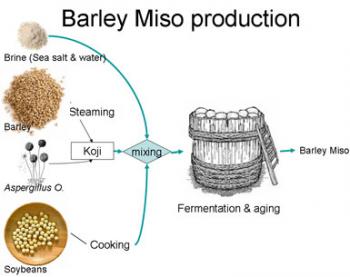FREE UK MAINLAND DELIVERY ON ORDERS OVER £55
Organic Japanese Barley Miso Paste - Pasteurised
Description
Ingredients
Whole soya beans* (36%), barley* (30%), sea salt, water. * organically grown
Nutritional Info
- High in Protein
For an explanation of the claims made above please click here
| Typical values | g per 100g |
|---|---|
| Energy kJ: | 639 kJ |
| Energy kCal: | 153 kcal |
| Fat: | 5.7 g |
| of which saturates: | 3 g |
| Carbohydrate: | 12 g |
| of which sugars: | 6.7 g |
| Protein: | 11 g |
| Salt: | 12.3 g |
How to Use
 Organic
Organic Kosher
Kosher Plant-based
Plant-basedAlso known as Mugi Miso, it is the traditional miso of rural Japan. This superb miso is made by traditional methods and is fully aged in cedarwood kegs for 1 to 2 years. It adds a rich flavour and concentrated goodness to sauces, baked dishes, soups and beans. It also makes an outstanding miso soup.
 2023 Great Taste Award Winner - 3 Stars
2023 Great Taste Award Winner - 3 Stars
In their words...
"This miso is rich in colour, unctuous and deep in umami flavour. The fermented flavour was reminiscent of blue cheese and shiitake mushroom, and the fruitiness really impressed the judges. Deep, rich and out of the ordinary."
"This miso paste packs a powerful punch! With aromas of brandy-soaked fruit loaf and intensely salty umami flavours, it is clear that a little will go a very long way with applications in cooking."
In 2023 the Great Taste Awards judged 14,195 products. Of these, only 248 achieved a 3-Star Great Taste Award (just 1.8%)!
This accolade really goes to our exceptional, fourth-generation artisanal family producer. They have been perfecting the art of miso production since 1876. They are champions of the finest quality, sustainably grown organic ingredients, with a deep respect and passion for traditional Japanese craftsmanship and great-tasting food!
What is miso?
 Miso is a traditional fermented Japanese staple food and seasoning made from different types of grains but mainly soya and a unique koji fermentation culture.
Miso is a traditional fermented Japanese staple food and seasoning made from different types of grains but mainly soya and a unique koji fermentation culture.
During the 18 years Clearspring's founder Christopher Dawson lived in Japan he became an expert on miso quality, and the Clearspring range is his selection of the finest traditionally made Japanese miso. All traditionally fermented Japanese miso is prepared by cooking the finest organically grown ingredients (whole soya beans and cereal grains) and combining them with a koji culture (grains or soya beans inoculated with Aspergillus oryzae mould spores) sea salt and water. Then naturally aged in cedarwood kegs over many months at ambient temperature the enzymes from the koji, along with naturally occurring yeasts and bacteria, gradually break down the complex grains and beans into readily digestible amino acids, fatty acids and simple sugars. The resulting miso has rich and complex flavours and an abundance of umami, the fifth taste.
How should miso be stored?
Generally, the best way to store miso to maintain its freshness and quality is in a cool cupboard or refrigerator. However, it really depends on climatic conditions and personal preference. High temperatures will encourage further fermentation, which although not harmful, will darken the colour and alter the flavour of the miso as well as possibly leading to a build-up of pressure within the packaging.
How salty is miso?
Salt plays an integral part in many fermented and pickled foods. It acts as a check to the fermentation process, creating foods with optimum nutrition but preventing them from spoiling. Miso contains enough salt to successfully control the fermentation, with the actual amount varying from 5% for lighter varieties up to 12% for stronger, darker varieties. Miso is a concentrated seasoning with considerable flavouring ability, so there is no need to use a lot of it. When substituting miso for salt, add approximately one to two teaspoons of miso for one quarter of a teaspoon of salt. This way salt intake can be lowered and full benefit gained from the flavour and nutrition of miso.
Are Clearspring soya foods non GM?
Organic certification does not allow genetic modification, so all Clearspring organic foods are therefore certified non GM. With its non-organic foods, Clearspring is careful to only trade products where there is a declaration from the supplier that all the ingredients are non GM.
What are the different varieties of miso?
Like with French wine or Belgian beers, miso comes in numerous varieties, each with its own unique taste, colour and texture, and each reflecting the local culture, crops and growing conditions of different regions of Japan. While sweet miso with lower soya content, less salt and more koji is popular in the south of Japan, darker miso, often called "aka" or red miso, contains more soya and less grain koji, and traditionally comes from the northern part of Japan. The Clearspring range includes the best of each type of miso, both dark and light, as well as pure soya bean and grain based varieties.
Should miso be cooked?
Unpasteurised miso contains an abundance of live enzymes that can be destroyed through prolonged cooking. However the nutritional properties, as well as the flavour of miso, are left unaltered by cooking, and some recipes suggest cooking miso to develop the flavour of other ingredients in the dish.
To maximise the enzymatic benefits of miso, choose an unpasteurised variety (or freeze-dried miso soup) and select recipes where miso is added towards the end of cooking.
What kind of dishes can it be used in?
Miso can be used instead of salt to flavour dishes such as soups and stews. It combines well with ingredients such as ginger, garlic, rice vinegar, tahini and citrus zest and juice. Check our recipe section for more specific suggestions.


